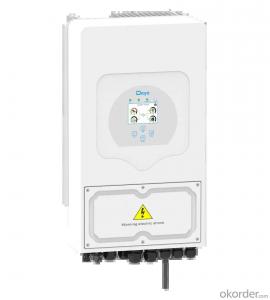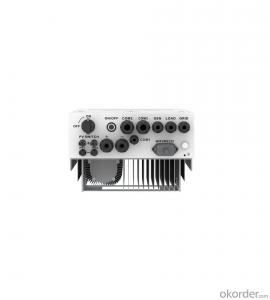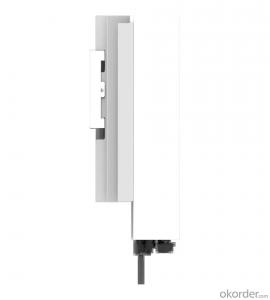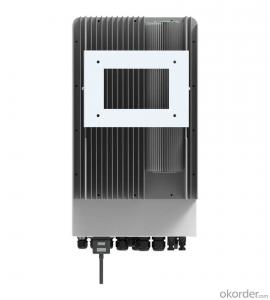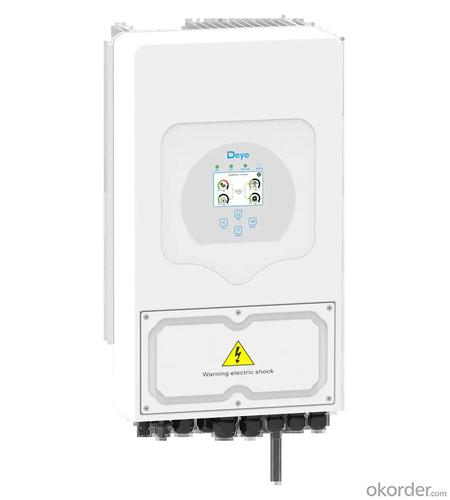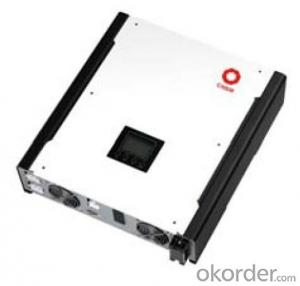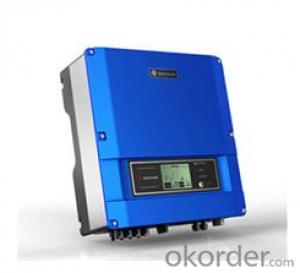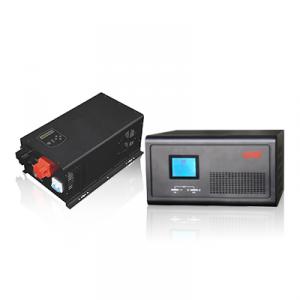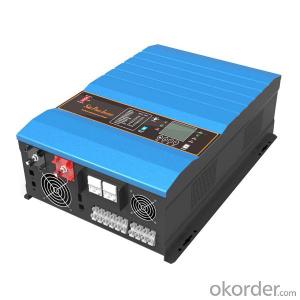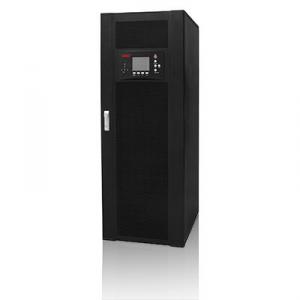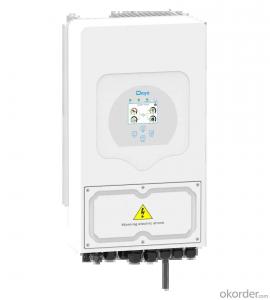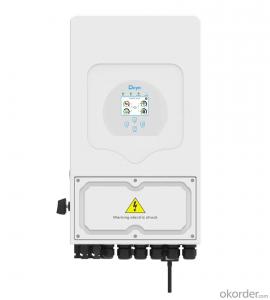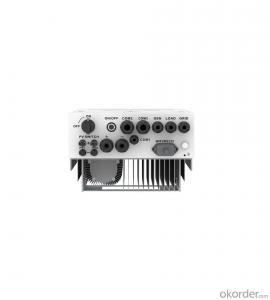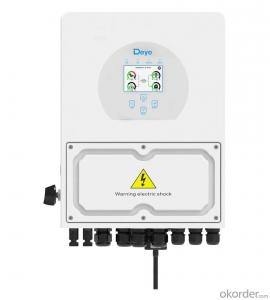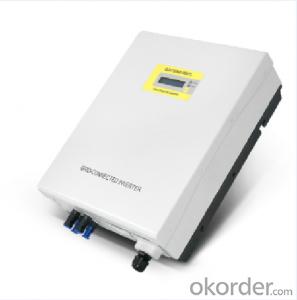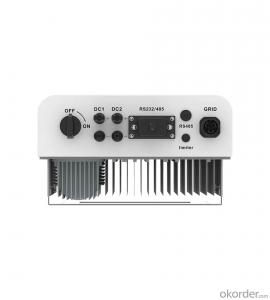Loom Solar Inverter Sun-5k-sg03lp1-eu 5kw Single Phase 2 MPPT Hybrid Inverter Low Voltage Battery
- Loading Port:
- Ningbo
- Payment Terms:
- TT OR LC
- Min Order Qty:
- 100 pc
- Supply Capability:
- 5000 pc/month
OKorder Service Pledge
OKorder Financial Service
You Might Also Like
Specification
SUN 5K-SG,hybrid inverter, is suitable for residential and light commercial use, maximizing self-consumption rate of solar energy and increasing your energy impendence. During the day, the PV system generates electricity which will be provided to the loads initially. Then, the excess energy will charge the battery via SUN 6K-SG. Finally, the stored energy can be released when the loads require it. The battery can also be charged by the diesel generator to ensure uninterrupted supply in the event of grid blackout.
100% unbalanced output, each phase; Max. output up to 50% rated power
DC couple and AC couple to retrofit existing solar system
Max. 16pcs parallel for on-grid and off-grid operation; Support multiple batteries parallel
Max. charging/discharging current of 240A
48V low voltage battery, transformer isolation design
6 time periods for battery charging/discharging
| Model | SUN-5K -SG03LP1-EU | |
| Battery Input Data | ||
| Battery Type | Lead-acid or Li-lon | |
| Battery Voltage Range (V) | 40~60 | |
| Max. Charging Current (A) | 120 | |
| Max. Discharging Current (A) | 120 | |
| External Temperature Sensor | Yes | |
| Charging Curve | 3 Stages / Equalization | |
| Charging Strategy for Li-Ion Battery | Self-adaption to BMS | |
| PV String Input Data | ||
| Max. DC Input Power (W) | 6500 | |
| Rated PV Input Voltage (V) | 370 (125~500) | |
| Start-up Voltage (V) | 125 | |
| MPPT Voltage Range (V) | 150-425 | |
| Full Load DC Voltage Range (V) | 300-425 | |
| PV Input Current (A) | 13+13 | |
| Max. PV ISC (A) | 17+17 | |
| Number of MPPT / Strings per MPPT | 2/1+1 | |
| AC Output Data | ||
| Rated AC Output and UPS Power (W) | 5000 | |
| Max. AC Output Power (W) | 5500 | |
| AC Output Rated Current (A) | 22.7 | |
| Max. AC Current (A) | 25 | |
| Max. Continuous AC Passthrough (A) | 35 | |
| Peak Power (off grid) | 2 time of rated power, 10 S | |
| Power Factor | 0.8 leading to 0.8 lagging | |
| Output Frequency and Voltage | 50/60Hz; L/N/PE 220/230Vac (single phase) | |
| Grid Type | Single Phase | |
| DC injection current (mA) | THD<3% (Linear load<1.5%)< td=""> | |
| Efficiency | ||
| Max. Efficiency | 97.60% | |
| Euro Efficiency | 97.00% | |
| MPPT Efficiency | 99.90% | |
| Protection | ||
| Integrated | PV Input Lightning Protection, Anti-islanding Protection, PV String Input Reverse Polarity Protection, Insulation Resistor Detection, Residual Current Monitoring Unit, Output Over Current Protection, Output Shorted Protection, Surge protection | |
| Output Over Voltage Protection | DC Type II/AC Type III | |
| Certifications and Standards | ||
| Grid Regulation | CEI 0-21, VDE-AR-N 4105, NRS 097, IEC 62116, IEC 61727, G99, G98, VDE 0126-1-1, RD 1699, C10-11 | |
| Safety EMC / Standard | IEC/EN 61000-6-1/2/3/4, IEC/EN 62109-1, IEC/EN 62109-2 | |
| General Data | ||
| Operating Temperature Range (℃) | -45~60℃, >45℃ derating | |
| Cooling | Natural cooling | |
| Noise (dB) | <30 dB | |
| Communication with BMS | RS485; CAN | |
| Weight (kg) | 20.5 | |
| Size (mm) | 330W x 580H x232D IP65 | |
| Protection Degree | IP65 | |
| Installation Style | Wall-mounted | |
| Warranty | 5 years | |
- Q: What are the common maintenance requirements for a solar inverter?
- Some common maintenance requirements for a solar inverter include regular cleaning to remove dust and debris, checking for loose connections or wiring issues, monitoring performance and output levels, and ensuring proper ventilation to prevent overheating. It is also important to keep an eye on the inverter's display for error messages or any signs of malfunctioning. Regular inspections and maintenance by a qualified technician are recommended to ensure optimal performance and longevity of the solar inverter.
- Q: Are there any noise or sound considerations with a solar inverter?
- Yes, there are noise considerations with a solar inverter. While solar inverters typically produce low levels of noise, it is important to ensure that the inverter is placed in a well-ventilated area to avoid any potential fan or cooling system noise. Additionally, some older models of inverters may produce a slight humming sound during operation, although newer models have significantly reduced this noise.
- Q: What is the maximum operating altitude for a solar inverter?
- The maximum operating altitude for a solar inverter can vary depending on the specific model and manufacturer. However, most solar inverters are designed to operate effectively up to an altitude of around 2,000 meters or 6,500 feet above sea level. It is important to consult the manufacturer's specifications for the specific model to determine the exact maximum operating altitude.
- Q: How does a solar inverter synchronize with the grid frequency?
- A solar inverter synchronizes with the grid frequency by continuously monitoring the frequency of the electricity supplied by the grid. It adjusts its own output frequency to match the grid frequency, ensuring that the electricity it generates is synchronized with the grid. This synchronization allows the solar inverter to seamlessly inject power into the grid and maintain a stable and reliable electrical supply.
- Q: What is the maximum AC current output of a solar inverter?
- The maximum AC current output of a solar inverter varies depending on the model and capacity of the inverter. Generally, it can range from a few amps to several hundred amps.
- Q: Can a solar inverter work during a power outage?
- No, a solar inverter cannot work during a power outage unless it is specifically designed with a battery backup system.
- Q: What is the maximum number of solar panels that a solar inverter can support?
- The maximum number of solar panels that a solar inverter can support depends on the capacity and specifications of the specific inverter model. There is no universal limit, as different inverters have different capabilities, but typically, a solar inverter can support anywhere from a few panels to several hundred panels. It is important to consult the manufacturer's guidelines and technical specifications to determine the maximum number of panels that a particular solar inverter can handle.
- Q: Can a solar inverter be used with a portable solar panel system?
- Yes, a solar inverter can be used with a portable solar panel system. The solar inverter is responsible for converting the direct current (DC) energy produced by the solar panels into alternating current (AC) that can be used to power electronic devices. A portable solar panel system typically includes a solar panel, a charge controller, and a battery, and the solar inverter can be connected to this system to convert the DC energy stored in the battery into AC energy for powering appliances or charging electronic devices.
- Q: How does a solar inverter handle voltage regulation during high demand?
- A solar inverter handles voltage regulation during high demand by constantly monitoring the grid voltage and adjusting its output accordingly. When there is high demand, the inverter ramps up its power output to ensure that the voltage remains stable and within the acceptable range. It does so by regulating the reactive power flow and employing advanced control algorithms to maintain grid stability.
- Q: Can a solar inverter be remotely monitored and controlled?
- Yes, a solar inverter can be remotely monitored and controlled. Many modern solar inverters are equipped with built-in communication capabilities, allowing them to be connected to a monitoring system or software. This enables users to remotely monitor the performance, efficiency, and power output of their solar inverters, as well as control various settings and parameters. Remote monitoring and control of solar inverters can provide real-time data, fault detection, and even allow for performance optimization, making it easier for owners or operators to manage and maintain their solar energy systems.
Send your message to us
Loom Solar Inverter Sun-5k-sg03lp1-eu 5kw Single Phase 2 MPPT Hybrid Inverter Low Voltage Battery
- Loading Port:
- Ningbo
- Payment Terms:
- TT OR LC
- Min Order Qty:
- 100 pc
- Supply Capability:
- 5000 pc/month
OKorder Service Pledge
OKorder Financial Service
Similar products
Hot products
Hot Searches
Related keywords
